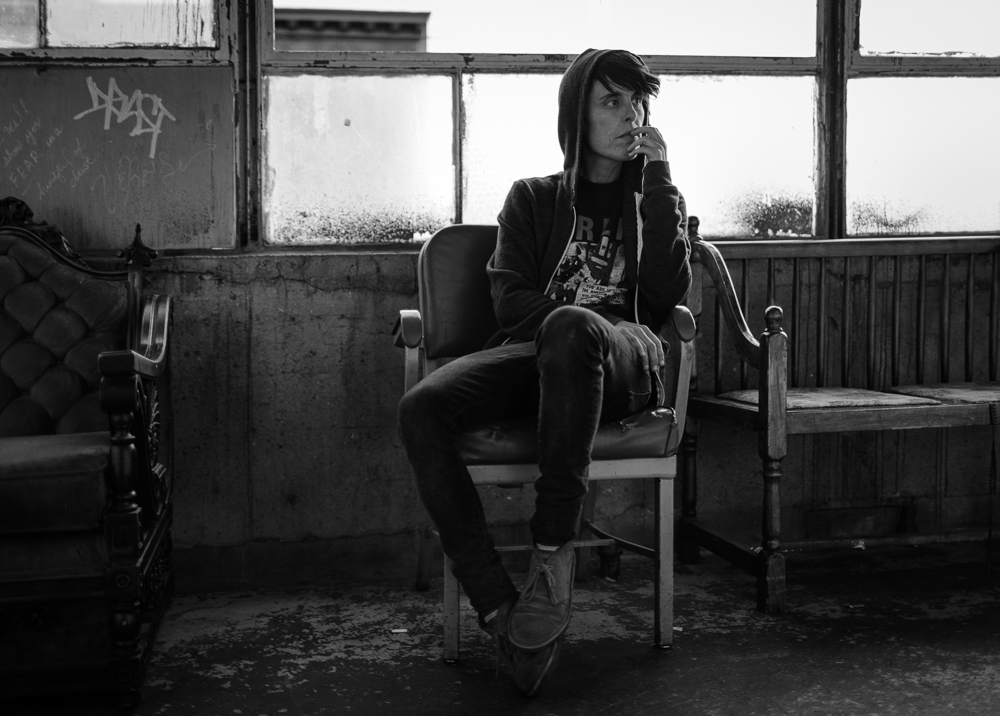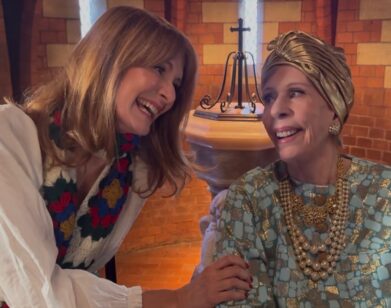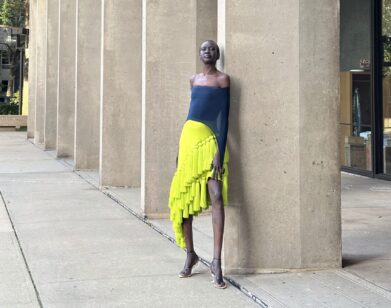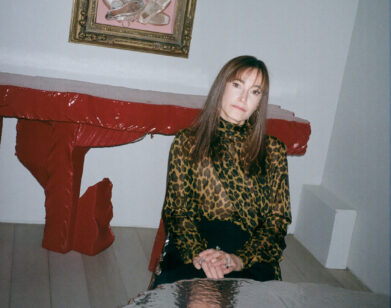The Pioneering Poet

ABOVE: ANDREA GIBSON IN NEW YORK, APRIL 2015. PHOTO BY VICENTE MUÑOZ.
“Eli came back from Iraq
And tattooed a teddy bear onto the inside of his wrist
Above that a medic with an IV bag
Above that an angel
But Eli says the teddy bear won’t live
And I know I don’t know but I say, “I know”
Cause Eli’s only 24 and I’ve never seen eyes
Further away from childhood than his” —Andrea Gibson, “For Eli”
If one theme connects Andrea Gibson’s poems, it is a recognition of our common humanity. Born and raised in a Baptist family in Maine, Gibson writes with intense compassion about love, sexuality, and social tragedy. In “For Eli,” the spoken word artist addresses America’s treatment of veterans; in “Ashes,” she talks with both defiance and pain about the brutal murder of homosexuals; in “Blue Blanket,” she explores the lingering guilt of a childhood sexual abuse.
Now 39, Gibson has been performing as a professional poet for over a decade. Last month, she released her sixth book of poetry, Pansy, and is currently touring the U.S. with a rotation of supporting acts including Amber Tamblyn. Here, while on the road in Buffalo, New York, she speaks to her old friend, comedian Tig Notaro.
TIG NOTARO: We met in Boulder, [Colorado]…how long ago? Do you remember when we met?
ANDREA GIBSON: I have your quote on the back of my book and you said 14 years ago, so I’m going to guess 14 years ago. That’s when I started doing Vox Feminista and I think that’s when I met you with Nancy.
NOTARO: I have a very bad memory, but I remember seeing you preform in Vox Feminista.
GIBSON: I remember being extra careful about wanting to be super hilarious and watching your face to see if you were laughing. I think I was dressed up as a cow the first time you were there.
NOTARO: [laughs]
GIBSON: They didn’t want me to do poetry because they thought that poetry was boring, so they had me dress up as a cow and talk about veganism. I spent most of the first time we interacted with udders.
NOTARO: You were in a cow suit?
GIBSON: I was in a cow suit.
NOTARO: That does sound vaguely familiar.
GIBSON: I was wearing a cow suit, but I was doing a very serious piece in retrospect I was doing a piece that was supposed to be really emotionally moving. I can’t believe I tried to pull that off.
NOTARO: How was my face? Was I smiling?
GIBSON: [laughs] I don’t think that you were smiling.
NOTARO: [laughs] It sounds like I wouldn’t have been.
GIBSON: But then we ended up hanging out at a party a few nights later when Nancy was carrying around that leg. Do you remember that? Somehow she had found a plastic leg—or maybe it was you who had shown up to the party with the leg, and didn’t mention it the whole time you were holding it during the party. It was one of the two of you.
NOTARO: I’ve had an ongoing fantasy about being interviewed on like a 60 Minutes-type show about this really inspiring woman that can do anything with a fake leg. And then the camera pans out and I’m just holding a mannequin leg. I bet it was me.
GIBSON: It probably was.
NOTARO: I’m going to take this credit.
GIBSON: I don’t think you were smiling that evening either and so then I felt better about the performance.
NOTARO: Okay, well I want to apologize, 14 years later, for not even just cracking the sympathy smile.
GIBSON: [laughs] No that was fine. The next night I got heckled, so the not smiling was tolerable.
NOTARO: And do you still perform with Vox Feminista?
GIBSON: I don’t. I performed with them up until about three years ago and then they, after 20 years, decided they needed a break from it. Vox isn’t really happening as much anymore. But I still keep everything I learned from them. Their motto was to comfort the disturbed and disturb the comfortable. I think about that a lot, when I’m on stage especially.
NOTARO: Yeah I remember that. I’m just barley aware and involved in certain events and topics and political issues—you would probably be very disappointed in me—but [Vox Feminista] was the world that opened me into it more. I went from zero to a million, because you guys were so hardcore, and disturbing, and enlightening, and dressed in cow suits.
GIBSON: I was the same way. I came straight out of the catholic college and half of my teachers were monks and nuns. I don’t feel like I learned much in college and then I went straight there.
NOTARO: I remember you being from Maine and I remember having this feeling that maybe your mother was disapproving about certain things. Am I correct about that?
GIBSON: You are correct. When I first got involved with Vox Feminista and poetry in general, I had recently come out to my family and that was a difficult time for me and my family. In the beginning, I was writing a lot of super angsty poetry—queer poetry. That was most of what I was talking about, actually. And so you probably heard me yelling about it quite a bit.
NOTARO: What was your childhood like? What was your relationship with your family like?
GIBSON: My childhood was a mix of things.
NOTARO: It wasn’t just one clear thing? [laughs]
GIBSON: [laughs] It was a mix, a whole blended mix of things. It was wonderful in a lot of ways, because I grew up in the woods in Maine and we spent the days running around in the creek and lakes and stuff like that. And in the winter it was so freezing, we drove snowmobiles instead of cars, and you could drive your snowmobile anywhere in town. But also I was bullied a bit for being gay before I knew, I guess.
NOTARO: So you were always kind of a tomboy? You weren’t ever prom queen or girly in anyway?
GIBSON: Gosh, was I prom queen? [laughs] No, I wasn’t prom queen. I remember my grandmother sewed my dress for the eighth grade dance and I loved it so much because she sewed it. I loved her so much that I would wear anything that she made. When she died I inherited her thimble collection and so now I have this great collection. I used to put them on my fingers and type my poems with ten little thimbles on them.
NOTARO: So, aside from your grandma sewing your dress that you loved…
GIBSON: I looked exactly the same as I do now. In fact, I think I had the exact same haircut. Except for when I went into high school, I had a perm phase. I don’t know if you’ve ever gotten a perm…
NOTARO: I have not.
GIBSON: Only one half took—only one side. So I would have a half perm and longer hair. I tried that for a little while but couldn’t really pull it off.
NOTARO: From when you were a child to now, there’d just be one weird little perm picture in the middle, but in general, you look the same?
GIBSON: Mostly, yeah. How about you?
NOTARO: I pretty much look the same. I went through a period of time where I believed that I was Chrissie Hynde from The Pretenders, so I looked a little different. I guess those would be my “perm” days, even though there wasn’t a perm. People kind of marvel over how much I still look the same. You didn’t know you were gay? I didn’t know I was gay. I had boyfriends, guys that I liked…I didn’t have a line of boyfriends down the street, but…
GIBSON: I had boyfriends. But I never had that thing where I felt madly in love; I didn’t feel the madly in love thing until the first time I had a girlfriend. But I did have boyfriends; they were pretty great. I liked them. I think in retrospect I was dating people that I wanted to be, which I actually did when I came out too. All the girls I first dated were just people I wanted to be. I couldn’t tell the difference for a while. I thought I was really attracted to Brad Pitt, and then I realized I just wanted to be him.
NOTARO: And then you dated women that looked or acted like Brad Pitt? Is that what you’re saying?
GIBSON: Totally, I am. That’s exactly what I’m saying. [laughs]
NOTARO: You started dating women that you wanted to be like rather than…
GIBSON: When I first started dating women I was dating sort of masculine, androgynous women. I still was wearing off my perm at that point—
NOTARO: There were still the remnants following you around shaming you. [laughs]
GIBSON: It was a little Axl Rose-ish at that point, I would tie a bandana around the front.
NOTARO: Oh well that’s fun! Do you identify as gay? How do you identify yourself as a person?
GIBSON: Queer! I identify as queer and I identify as gender queer.
NOTARO: What is that?
GIBSON: That just means that I don’t necessarily identify within a gender binary. I’ve never in my life really felt like a woman and I’ve certainly never felt like a man. I look at gender on a spectrum and I feel somewhere on that spectrum that’s not landing on either side of that.
NOTARO: How does your mom digest you being gender queer?
GIBSON: I’ve never said that word to her, ever. So I don’t think she digests it; I don’t think that she knows it exists. But she was going to post a picture of me in this little velvet green dress that I wore when I was three or four on Facebook—
NOTARO: Grandma’s work?
GIBSON: [laughs] Yeah, my grandma actually made this little velvet dress.
NOTARO: Ah, Granny.
GIBSON: She was going to post it on Facebook and she called me and asked me if was okay because it was me in a dress and I said, “Absolutely, I loved that dress.” It was velvet and so soft.
NOTARO: Well that’s considerate.
GIBSON: Yeah it was the only sort of gender conversation we’ve ever really had, but I thought it was sweet.
NOTARO: And it’s a close and loving relationship with your family?
GIBSON: You know we’ve been building it. It was sort of a strained time for a number of years after I came out.
NOTARO: I feel like that’s when I met you, maybe things were still very tough…
GIBSON: Totally. I was in my early 20s, and I was pretty angry, too, at that point, and heartbroken. I’ve always loved my family so much so that was a difficult time. But now I would say yes, we’re close.
NOTARO: What were you angry and heartbroken about?
GIBSON: They really didn’t believe that I could be happy as a queer person, so they didn’t think that they could [support it] and just didn’t understand. I think they understand it now.
NOTARO: Are they supportive of your career as a poet?
GIBSON: Yeah. My father will call me up after a show and ask me if I’ve sold any tapes—”How many tapes did you sell tonight?” It’s sort of great because I still print my CDs at a place called Tapes Again because I adore the guy who started the company. But they were always supportive when I was a kid about my art life. I painted and I drew and I wrote and they were always very encouraging of that. I think that sort of thing sticks with you—the feedback we’re given when we’re that young.
NOTARO: In the past I played in bands, worked at coffee shops, babysat, and worked as a production assistant. What did you do before you were selling so many tapes?
GIBSON: Oh my god. [laughs] I did so many things. I was an ice bagger at a convenience store, which means I would stand in this really, really hot room all day and bag the ice that they would sell in bags. You would think the room would be cold but it wasn’t because the ice machines were giving off heat. I was a pizza-maker. My uncle put a video store in the closet in the J.C Penny’s that he ran and so I worked in that closet. Nobody would really come in because they didn’t know that there was a video place back there. I worked for a while picking up trash as a construction worker.
NOTARO: So all glamorous.
GIBSON: [laughs] Yes. And at a paper mill. I worked as a telemarketer selling a product called “Score,” which was cologne. I think the tagline on it was “a cologne guaranteed to get any man laid in the club.” I worked for place called Auto Europe when I didn’t know where anything was in Europe so I quit before anybody went and got their car reservation.
NOTARO: When did poetry seep into your consciousness? You said you started doing it in high school.
GIBSON: Kind of. I was going to college to play basketball; I didn’t know what else I wanted to do besides play basketball. I thought I was going to be the first woman in the NBA at the time. That didn’t work out. Right before I went to college, I got this F back on a paper I had written that I was super proud of, and the teacher didn’t believe I had written it, and I went and cried and ran down to the principles office. Actually, I decided to study writing in college after I got that paper back. So when I went to college I started writing more poetry, but I never ever thought I’d get on a stage because I had—and still do [have]—really frantic stage fright. But then I was in Boulder—I’d gone from Maine to New Orleans to Boulder—I went to a poetry reading just a few days after I’d gotten broken up with and my heart was just busted. I keep thinking about the phrase “grief brave” and that’s how I felt, and so I got myself up on stage and read a poem on stage for the first time and then fell in love with it. I discovered Vox Feminista and poetry sort of in the same time, right around that heartbreak time.
NOTARO: Obviously musicians, comics, writers—everybody hates their old stuff. Do you hate your old stuff? Do you have anything specific where you’re like, “Oh my gosh, I actually wrote this and said this out loud?”
GIBSON: Totally.
NOTARO: Can I hear it?
GIBSON: No! [laughs] I was doing this radio interview a couple of months ago and I wrote a poem on the radio and then the woman said, “That’s was great, Andrea. That was really great. Listen, we couldn’t hear a word you said, could you do that one more time?”
NOTARO: [laughs]
GIBSON: I actually have more forgiveness for stuff that I just think is “bad.” Then I think, “Wow. I’ve learned more about the craft of writing.” I can tolerate that stuff. But the hard stuff for me is when my politics completely shift on something. Because I’ve been writing so long, I can look back at stuff that I may have written even three or four years ago, where I just socially, politically, absolutely disagree with what I said and can see the ways that it could of potentially been harmful. And I get feedback like that often from people in the audience, who have read something of mine, and typically their feedback is expressed to me in a really kind manner, and I would say 99 percent of the time I’ve gotten feedback on something I’ve written being problematic, it’s been right-on and I’ve changed it. But unfortunately, if something’s in print from ten years ago, that upsets me.
NOTARO: That’s interesting. ‘Cause for me with standup, it’s just like, “Oh my gosh…that is so dumb.”
GIBSON: But people love it!
NOTARO: Yeah. I try not to look at my old stuff, or my new stuff, really. I’m not a fan.
GIBSON: My friend, I’m not going to say her name, but she’s a musician, and I walked into her house once and her album was just blaring on the stereo, and she’s like, “What? I wouldn’t make this music if I didn’t like it.”
NOTARO: Amazing.
GIBSON: I love the idea of somebody in their house listening to their own album.
NOTARO: I know. When I’ve had to edit my albums, I’ll listen to it one time through and I’ll make edits. I want to remember to set up a camera to record myself listening to my set, because I don’t even slightly crack a smile, I am just listening for technical details, and I look like somebody that has absolutely no sense of humor. I look insane. What about writing? You strike me as somebody that writes all the time. Do you sit down with an old-timey typewriter and just click out things?
GIBSON: I wish I was that cool. I don’t actually sit when I write, I run around my house.
NOTARO: At a high speed? Like literally run around?
GIBSON: Truly, I run around yelling, and I know the sound of a poem before I know the words to it. So I’m running around making all these loud sounds, just trying to capture the energy.
NOTARO: Like what?
GIBSON: I’m not doing it! [laughs]
NOTARO: Oh come on. Let’s see how they type it out on the interview.
GIBSON: I’ve been walked-in on a couple of times and I feel like I can never look at those people the same again. I was embarrassed.
NOTARO: I write on stage.
GIBSON: Do you really?
NOTARO: Yeah! I write on stage!
GIBSON: You mean you’re improvising when you’re up there?
NOTARO: Until I get it right. I’m repetitive in the way that I’ll go up, do another show, and work out what I did last time, but you would never find the lost writings of Tig Notaro.
GIBSON: Wow, yeah, that’s impressive. I write for it to be spoken out loud, so I don’t know whether or not a line is going to work or resonate until I do it live. Until I’ve performed it, maybe 10 or 15 times, it’s not really in stone.
NOTARO: Is there an ongoing message in what you’re writing about?
GIBSON: I think that I have a lot of repeating themes. I just made a t-shirt that says, “Feelings are not the enemy.” I guess that’s what it’s about—just being expressive with your feelings and the ways that we’re culturally expected to closet our emotions. The idea that there’s just a closet around love or sexuality is sort of hilarious. I think we’re also that way with grief and panic and anxiety and depression, and I think we also closet our bliss. We’re culturally expected to taper it all down. I would say that’s sort of the theme of my show.
NOTARO: That’s a good theme. I think when my life fell apart a couple years ago was when I realized the importance of expressing myself and truly sharing what was really going on rather than protecting myself. What utterly moves you?
GIBSON: That’s a good question. [pause]
NOTARO: Sounds like nothing. We’ll move on.
GIBSON: [laughs] No, no, no! I want to answer this one. I think I’m really moved by people changing their minds—when I see somebody change their perspective on something. That’s my favorite thing about art. I don’t think people change their minds very quickly, but I think that peoples’ hearts can change in an instant. So I’m really moved when somebody’s perspective is shifted. Art has done that to me a bunch.
NOTARO: Who is your typical audience?
GIBSON: Probably a lot of feminists, a lot of queers. Poets, artist-types.
NOTARO: Don’t you get those fun surprises though? I get those, where I’m like, “You’re a fan of mine? This is hilarious.”
GIBSON: Yeah, that happens too.
NOTARO: Is there anybody you wish was your audience?
GIBSON: I do wish that I was performing more often for more crowds of people that would actually get up and walk out because they disagreed with me—the disturbing the comfortable thing. I write a lot of my pieces to hopefully change perspectives and so I wish they were reaching more people that think differently than I do. I write a lot of God into my poems because I grew up in a Baptist church and then a catholic university, and I’m sort of trying to reclaim that all in my own way a little bit when I’m writing and so I wish I was performing in more churches. I get invited to catholic universities sometimes.
NOTARO: Are you religious?
GIBSON: I’m not religious but I feel like a spiritual person for sure. I don’t know what I think of when I think of God; I guess I think of whatever that love energy [is].
NOTARO: An older man on a cloud?
GIBSON: With the gates in front of him.
NOTARO: Yeah.
GIBSON: That’s what I think of mostly, a guy on a cloud.
FOR MORE ON ANDREA GIBSON AND HER U.S. TOUR, VISIT HER WEBSITE. TIG NOTARO IS AN L.A.-BASED COMEDIAN WHO MOST RECENTLY STARRED IN THE SHOWTIME SPECIAL KNOCK KNOCK, IT’S TIG NOTARO. FOR MORE INFORMATION ON NOTARO AND TO SEE HER COMEDY TOUR DATES, VISIT HER WEBSITE.






